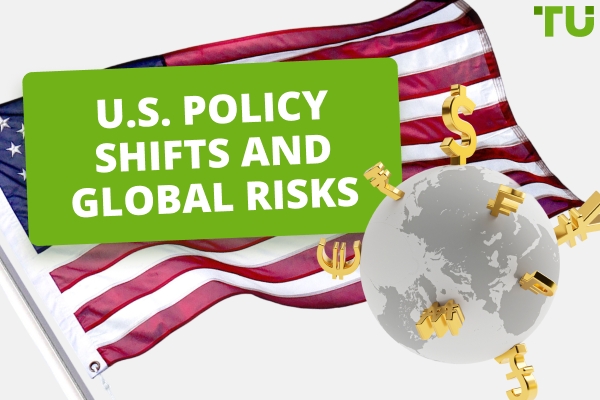Should You Invest $100 in Forex Today?
Investing $100 in Forex today involves potential profits but also risks. Experts suggest starting small, using demo accounts, and educating yourself. Factors like risk tolerance, market changes, and trading strategies influence earnings. It's essential to stay on trend, effectively control risks, and be realistic about the challenges and possibilities in the dynamic world of Forex trading.
In this article, TU experts will delve into the domain of Forex trading, specifically focusing on the question: Is Forex a good investment, especially for those looking to start with $100? The discussion will cover essential aspects such as potential profits, factors influencing earnings, methods to earn through Forex, and the pros and cons of investing in this dynamic financial market. Readers can expect valuable insights into the risks, rewards, and practical tips for making informed decisions in the Forex investment journey.
-
Is $100 enough to start Forex?
Starting with $100 in Forex is possible, but it's crucial to manage risks wisely, consider smaller position sizes, and focus on gradual growth due to the volatile nature of the market.
-
How to turn $100 into $1000 in Forex?
While turning $100 into $1000 is feasible in Forex, it requires careful risk management, strategic trading, and a realistic approach, acknowledging that significant returns come with proportional risks.
-
Can I day trade with $100?
Day trading with $100 is possible, but it involves higher risk due to limited capital. It's essential to choose low-cost assets, employ reasonable leverage, strict risk management, and consider building capital gradually.
-
Is today a good day to trade Forex?
Determining if today is a good day to trade Forex depends on market conditions, economic events, and personal strategy. Traders should assess relevant factors and adhere to their trading plans for informed decisions.
Is investing in Forex profitable?
Forex trading holds the potential for profit, given its vast $10,5 trillion daily turnover. However, it's not a guaranteed shortcut to wealth. Studies reveal that 80-90% of individual traders often lose money due to unrealistic expectations and emotional decisions. Success in Forex requires a deep market understanding, disciplined trading strategies, and proper risk management. Starting with a realistic capital and gradually increasing it, along with industry reports suggesting 5-10% achieving long-term profitability, highlights the challenges and possibilities in Forex trading. Methods to earn through Forex trading are highlighted in the below table.
| Method | Description | Analogy | Pros | Cons |
|---|---|---|---|---|
Active Trading |
Involves buying and selling currencies based on market analysis. Similar to playing the stock market but with currencies. Requires predicting currency movements accurately. |
Like playing a game where you have to predict the next move. |
High profit potential |
High risk, requires expertise |
Affiliate Programs |
Earn money by promoting trading platforms. Receive a commission when others sign up through your recommendation. |
Similar to recommending a good restaurant and getting a thank-you from the restaurant. |
Passive income through referrals |
Success depends on building a network |
Bonuses |
Platforms offer extra money when you start trading. Be cautious of rules attached to bonuses, like using them in specific ways. |
Like receiving a gift card with certain conditions. |
Boosts initial capital |
Rules and conditions may limit flexibility |
Copy Trading |
Instead of trading yourself, mimic the moves of successful traders. Past success doesn't guarantee future success. |
Similar to coping strategies in a game from a skilled friend. |
No need for active trading skills |
Possibility of losses, reliance on others' performance |
Other Passive Income |
Some platforms offer interest on deposited funds. Similar to earning interest in a savings account. |
Like putting money in a savings account that earns interest. |
Less involvement, more stable returns |
Profits are usually smaller compared to active trading |
Best Forex brokers in 2024


How much money can a beginner in Forex trading earn per year?
Beginning your journey in Forex trading as a newcomer is both thrilling and full of challenges. Understanding what influences your income is crucial for setting realistic expectations.
Factors Affecting Your Earnings
-
How Much You Start With: The money you initially invest directly affects how long you will trade and how much you can earn.If you start with a small amount, it limits your potential profits. Be careful with risks, especially since Forex can make both gains and losses bigger.
-
Market Changes: The Forex market is always changing because of global events, economic data, and what central banks are doing. This means the market can be unpredictable, which makes it difficult to earn a stable income.
-
Knowing Your Stuff: To do well in trading, you need to know about it. This includes understanding technical analysis, having good risk management, and learning strategies. It's important to learn and practice before expecting big profits.
-
How Often and How You Trade: Some people trade a lot every day (day trading), which can bring in more money but also more risk. Others trade less often (swing trading). Choose a style that suits you and how much risk you're comfortable with.
-
Costs of Trading: Different brokers charge different fees, and these can eat into your profits. Look for brokers with good deals, and remember to include these costs when you're figuring out how much you're making.
Other Important Things
-
Staying Strong Mentally: Trading can be tough on your emotions, especially when you lose money. Being able to handle losses and stick to your plan is crucial for long-term success.
-
Getting Good Information: Having good tools and information is important for making good decisions. Make sure you have access to reliable data and educational resources to help you make better choices and, in turn, increase your chances of making money.
Why Investing in Forex is a Good Idea
When considering Forex trading, it's essential to explore the potential advantages that attract many investors. Here are some of the main pros:
High Liquidity
Forex stands as the largest financial market globally, with trillions traded daily. This high liquidity ensures easy entry and exit from positions, minimizing slippage and providing flexibility not commonly found in less liquid markets.
24/7 Accessibility
Unlike traditional stock exchanges, Forex operates 24/5. This allows traders to participate around the clock, potentially capitalizing on opportunities regardless of location or time zone.
Leverage
Forex brokers often offer leverage, enabling control of larger positions with a smaller capital amount. While this magnifies potential profits, it's crucial to exercise responsible risk management due to the amplified losses associated with leverage.
Diverse Trading Strategies
The market offer diverse trading strategies. Traders can go long (expecting appreciation) or short (expecting depreciation), capitalize on short-term price movements (scalping), or focus on longer-term trends. Flexibility to adapt strategies based on market conditions sets Forex apart from traditional stock trading.
Potential for High Returns
With proper analysis, risk management, and a bit of luck, Forex trading can yield potentially high returns compared to other investment options. However, it's important to acknowledge that the prospect of high rewards comes with equally high risks.
Lower Transaction Costs
Compared to some markets, Forex trading generally involves lower transaction costs, such as spreads and commissions. This can make it more cost-effective for active traders.
Why Investing in Forex Might Be a Problem
Despite its potential benefits, Forex trading comes with significant drawbacks that require careful consideration. Here are some of the main cons:
High Volatility
Currency markets are inherently volatile, subject to rapid and unpredictable fluctuations driven by economic, political, and social factors. Managing this volatility is crucial to preventing significant losses.
Leverage Risk
While leverage can amplify profits, it equally magnifies losses. Inadequate risk management can result in a small adverse price movement, wiping out the entire trading capital.
Psychological Demands
Forex trading demands significant emotional control and discipline. Emotions such as fear, greed, and overconfidence can lead to impulsive decisions and costly mistakes, emphasizing the need for emotional resilience.
Steep Learning Curve
Mastering Forex trading requires extensive knowledge of technical and fundamental analysis, risk management strategies, and various trading methodologies. Beginners should be prepared for a steep and time-consuming learning curve.
Regulatory Landscape
Regulations in the Forex market may vary, potentially exposing traders to counterparty risks and scams. Understanding the regulatory environment in your location is crucial for mitigating risks.
Information Overload
The constant flow of news and analysis in Forex can be overwhelming. Filtering relevant information for informed decision-making is challenging, and information overload can lead to missed opportunities.
Not a Get-Rich-Quick Scheme
Despite the potential for high returns, Forex trading is not a shortcut to wealth. Success requires dedication, discipline, and continuous learning. It's crucial to acknowledge that success stories are often outliers, and consistent profitability is challenging.
How much should I invest in Forex?
When starting out in Forex, it's wise to begin with a small investment, like $10 to $500, based on your comfort level. Consider brokers like RoboForex that allow a minimum deposit of $10 to start Forex trading. Remember, Forex trading involves risks, and you could lose your entire investment. Assess your risk tolerance and only invest what you can afford to lose without affecting your essential expenses or future goals. If unsure, seek advice from a financial advisor.
Take advantage of demo accounts offered by brokers to practice without using real money. Educate yourself on Forex trading, including analysis techniques and risk management. Have a realistic outlook – Forex is a long-term game requiring patience and continuous learning. And always remember, there are no guaranteed profits in trading.
Is investing $100 or $1000 in Forex enough?
Deciding whether to invest $100 or $1000 in Forex depends on individual circumstances and risk tolerance. The key principle is to never invest more than you can afford to lose, given the inherent risks in Forex trading. Some key tips to keep in mind are highlighted by experts in the below table.
| Tips | Explanation |
|---|---|
Start Small |
Begin with $10 to $500, especially for newcomers, considering the volatile nature of Forex markets. |
Consider Risk Tolerance |
Choose an investment amount that aligns with your comfort level, ensuring it won't impact essential living expenses or future financial goals. |
Use Demo Accounts |
Practice trading with virtual currency through demo accounts provided by many Forex brokers to develop strategies before risking real capital. |
Educate Yourself |
Thoroughly research Forex trading, understanding technical and fundamental analysis, different strategies, and risk management techniques. |
Manage Your Risk |
Implement a risk management plan, including setting stop-loss orders, diversifying your portfolio, and avoiding excessive leverage to limit potential losses. |
Select a regulated and reputable broker by checking reviews, comparing fees, ensuring proper licensing, and obtaining authorization to operate in your jurisdiction. |
|
Be Patient and Realistic |
Forex trading is a long-term endeavor; maintain discipline, patience, and a continuous learning mindset, avoiding unrealistic expectations of quick wealth. |
Glossary for novice traders
-
1
Day trading
Day trading involves buying and selling financial assets within the same trading day, with the goal of profiting from short-term price fluctuations, and positions are typically not held overnight.
-
2
BaFin
BaFin is the Federal Financial Supervisory Authority of Germany. Along with the German Federal Bank and the Ministry of Finance, this government regulator ensures that licensees abide by eurozone laws.
-
3
Leverage
Forex leverage is a tool enabling traders to control larger positions with a relatively small amount of capital, amplifying potential profits and losses based on the chosen leverage ratio.
-
4
Investor
An investor is an individual, who invests money in an asset with the expectation that its value would appreciate in the future. The asset can be anything, including a bond, debenture, mutual fund, equity, gold, silver, exchange-traded funds (ETFs), and real-estate property.
-
5
CFD
CFD is a contract between an investor/trader and seller that demonstrates that the trader will need to pay the price difference between the current value of the asset and its value at the time of contract to the seller.
Team that worked on the article
Parshwa is a content expert and finance professional possessing deep knowledge of stock and options trading, technical and fundamental analysis, and equity research. As a Chartered Accountant Finalist, Parshwa also has expertise in Forex, crypto trading, and personal taxation. His experience is showcased by a prolific body of over 100 articles on Forex, crypto, equity, and personal finance, alongside personalized advisory roles in tax consultation.
Dr. BJ Johnson is a PhD in English Language and an editor with over 15 years of experience. He earned his degree in English Language in the U.S and the UK. In 2020, Dr. Johnson joined the Traders Union team. Since then, he has created over 100 exclusive articles and edited over 300 articles of other authors.
Tobi Opeyemi Amure is an editor and expert writer with over 7 years of experience. In 2023, Tobi joined the Traders Union team as an editor and fact checker, making sure to deliver trustworthy and reliable content. The topics he covers include trading signals, cryptocurrencies, Forex brokers, stock brokers, expert advisors, binary options.
Tobi Opeyemi Amure motto: The journey of a thousand miles begins with a single step.











